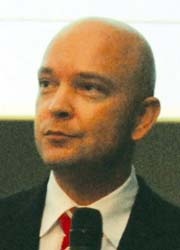Personnel deficits
Delegate some physicians' tasks to nurses, or watch hospital systems collapse
by Bettina Döbereiner
Healthcare in Germany will suffer if doctors and nurses cannot delegate certain tasks to others. So warned Udo Janssen MD MBA, speaking at the recent Gesundheitsnetzwerker (health network) congress held in Berlin. Blaming the inflexibility of new labour models that make them difficult to implement, Dr Janssen believes they need to be reviewed.

Hospitals not only face insufficient budgets and a huge increase in patients aged over 60 years, but also a shortage of medical staff. Almost 18,000 doctors will probably retire up to 2017, he pointed out, but an equivalent number of young doctors is not expected in the near future. A ‘market adjustment’ is vital to avoid some clinical departments breaking down due to lack of personnel, and even whole hospital systems collapsing.
Doctors and nurses need to become more flexible about delegation. German doctors, he believes, are mentally conservative about the transference of responsibility to others, or even sharing knowledge and experience they have gained. Conversely, in Great Britain for example, qualified nurses take on tasks that, in Germany, are considered to be solely the jobs of doctors.
During his lecture, Dr Janssen presented a concept for task sharing, in which doctors, to focus on their key-competences, would delegate parts of their work to nurses qualified in those tasks. To do this, it would be necessary to develop new qualification programmes to educate nurses to become medical assistants. The concept was met with some criticism. It was very doubted that nurses would be willing to undertake a doctor’s task due to the great responsibility. It was also pointed out that there is neither a pre-existing structure, nor legal cover, that could enable the realisation of his model. Dr Janssen argued that, due to a lack of staff, compromises should be made and more responsibility taken and new methods should be explored.
In addition, because medical personnel levels need to be maintained, but European manpower resources, particularly in Scandinavia and East European countries, are too limited and costly, he suggested ‘limited and temporary labour migration’ within the EU, which would permit Indian medical professionals, for example, to work here.
20.05.2009





